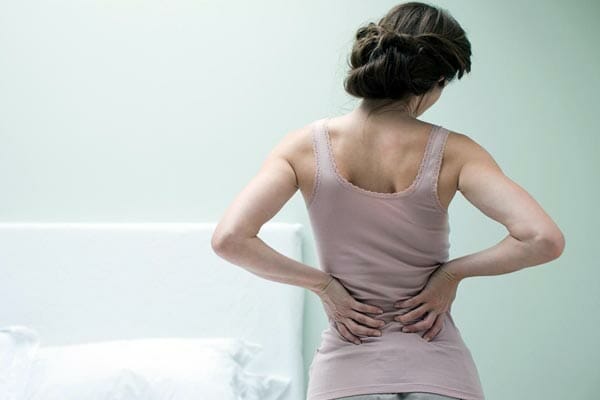Back pain is an extremely common ailment that affects people of all ages. According to the World Health Organization, it is the leading cause of disability worldwide. While there are a variety of treatments available, such as physical therapy and medication, the role of diet in managing back pain is often overlooked. In this article, we will explore the connection between diet and back pain and share some foods to include and avoid in order to achieve relief.

Understanding the Connection Between Diet and Back Pain
Back pain is a common condition that affects millions of people worldwide. While the exact causes of back pain can vary from person to person, there are a few underlying factors that have been linked to the condition. In this article, we will explore the connection between diet and back pain and how making changes to your diet can help alleviate your symptoms.
Inflammation and its Effects on Back Pain
Research has shown that inflammation is a common factor in people with chronic back pain. Inflammation is the body’s response to injury or illness, and it can cause pain, stiffness, and swelling in the affected area. Certain foods have been shown to increase inflammation in the body, such as processed meats, refined sugars, and saturated fats. By avoiding these foods and incorporating more anti-inflammatory foods into your diet, you may be able to reduce inflammation and alleviate your back pain.
Anti-inflammatory foods include fruits and vegetables, whole grains, nuts, and fatty fish. These foods contain antioxidants and other compounds that can help reduce inflammation in the body. Adding these foods to your diet can not only help alleviate your back pain but also improve your overall health.
The Role of Body Weight in Back Pain
Excess weight puts additional pressure on the spine and can contribute to back pain. If you are overweight, losing just a few pounds can make a significant difference in your pain levels. Additionally, maintaining a healthy weight through a balanced diet and regular exercise can help prevent further back pain.
When it comes to weight loss, it’s important to focus on making sustainable changes to your diet and lifestyle. Crash diets and extreme exercise regimens can do more harm than good and may even exacerbate your back pain. Instead, aim for gradual weight loss through a combination of a healthy diet and regular exercise.
Nutrient Deficiencies and Back Pain
A lack of certain nutrients can weaken the bones and muscles in the back, making them more susceptible to injury and pain. Calcium and magnesium are essential for strong bones, while omega-3 fatty acids have anti-inflammatory properties. Ensuring that your diet includes these nutrients can help protect your back and reduce pain.
You can get calcium and magnesium from dairy products, leafy green vegetables, and nuts. Fatty fish, such as salmon and tuna, are a good source of omega-3 fatty acids. If you have trouble getting enough of these nutrients from your diet, you may want to consider taking supplements.
Conclusion
While there is no one-size-fits-all solution for back pain, making changes to your diet can be a helpful tool in managing your symptoms. By avoiding inflammatory foods, maintaining a healthy weight, and ensuring that your diet includes essential nutrients, you can protect your back and reduce pain.
Foods to Include in Your Diet for Back Pain Relief
Back pain can be a debilitating condition that affects your daily life. While there are many treatment options available, including medication and physical therapy, incorporating certain foods into your diet can also help alleviate back pain. Here are some foods you should consider adding to your diet to help relieve back pain.
Anti-inflammatory Foods
Inflammation is a common cause of back pain, and incorporating anti-inflammatory foods into your diet can help reduce inflammation and alleviate pain. Some examples of anti-inflammatory foods include fatty fish, such as salmon and tuna, leafy greens like spinach and kale, nuts and seeds, and berries. These foods are rich in antioxidants and other compounds that can help reduce inflammation in the body.
Foods Rich in Omega-3 Fatty Acids
Omega-3 fatty acids are essential fats that have been shown to have anti-inflammatory properties. Foods high in omega-3 fatty acids include oily fish, flaxseed, and chia seeds. These foods can help reduce inflammation and alleviate back pain.
Foods High in Magnesium and Calcium
Magnesium and calcium are two minerals that are important for bone health. Consuming foods that are high in these minerals can help keep your bones strong and healthy, which can in turn help alleviate back pain. Dairy products, leafy greens, nuts, and seeds are all good sources of calcium and magnesium.

Hydrating Foods and Beverages
Staying hydrated is important for all aspects of health, including back pain. Dehydration can cause muscle cramps and other types of pain, so it’s important to drink plenty of water and consume hydrating foods like watermelon and cucumber. These foods can help keep your spine healthy and alleviate back pain.
By incorporating these foods into your diet, you can help alleviate back pain and improve your overall health and well-being. However, it’s important to remember that diet alone may not be enough to completely alleviate back pain. If you are experiencing chronic or severe back pain, it’s important to seek medical attention to determine the underlying cause and develop an appropriate treatment plan.
Foods to Avoid for a Healthy Back
Back pain is a common health issue that can be caused by a variety of factors, including poor posture, injury, and even the foods you eat. Certain foods can increase inflammation in the body, which can worsen back pain. To help reduce your discomfort, it’s important to be mindful of the foods you consume.
Inflammatory Foods
Foods that can increase inflammation in the body include processed meats, refined sugars, and saturated fats. These types of foods can also contribute to weight gain, which can put additional strain on your back. Instead, try incorporating more anti-inflammatory foods into your diet, such as leafy greens, fatty fish, and nuts.
Foods High in Refined Sugars
Sweets, desserts, and sugary drinks may be tempting, but they can cause inflammation and contribute to weight gain, both of which can worsen back pain. Instead of reaching for a candy bar or soda, try satisfying your sweet tooth with fresh fruit or a small piece of dark chocolate.
Processed Foods and Artificial Additives
Processed foods often contain high levels of preservatives, additives, and other chemicals that can increase inflammation in the body. Opting for whole, natural foods is a healthier choice for your back and overall well-being. Try incorporating more fruits, vegetables, whole grains, and lean proteins into your meals.
Excessive Caffeine and Alcohol Consumption
While moderate consumption of caffeine and alcohol is not necessarily harmful, excessive amounts can contribute to inflammation and dehydration, both of which can worsen back pain. Instead of reaching for another cup of coffee or glass of wine, try hydrating with water or herbal tea.
By avoiding these foods and incorporating more anti-inflammatory, whole foods into your diet, you can help reduce inflammation in your body and alleviate your back pain. Additionally, maintaining a healthy weight through a balanced diet and regular exercise can also help prevent back pain from occurring in the first place.
The Importance of a Balanced Diet and Lifestyle
While making changes to your diet can certainly help alleviate back pain, it is important to remember that a balanced lifestyle is also crucial for overall health. A balanced diet and lifestyle can help reduce the risk of chronic diseases such as diabetes, heart disease and obesity. It can also improve mental health, increase energy levels, and enhance overall well-being.
One of the most important aspects of a balanced lifestyle is regular exercise. Exercise not only helps to strengthen the muscles in your back and reduce pain, but it also has numerous other health benefits. Exercise can help to improve cardiovascular health, increase bone density, and reduce the risk of chronic diseases such as cancer and diabetes.
The Role of Exercise in Back Pain Management
Regular exercise can help strengthen the muscles in your back and reduce pain. It is important to choose low-impact exercises that are gentle on the back, such as yoga, swimming, and walking. These exercises can help to increase flexibility, improve posture, and reduce stress on the spine.
In addition to these exercises, it is also important to incorporate strength training exercises into your routine. These exercises can help to strengthen the muscles in your back, which can help to reduce the risk of injury and pain.
Stress Reduction Techniques for Back Pain Relief
Stress can cause tension in the muscles of the back, leading to pain and discomfort. Practicing relaxation techniques such as meditation, deep breathing, and massage can help reduce stress and alleviate back pain.
In addition to these techniques, it is also important to take breaks throughout the day to stretch and move. This can help to reduce tension in the muscles and improve circulation, which can help to alleviate pain and discomfort.
The Benefits of Proper Sleep and Posture
Getting enough sleep and maintaining proper posture throughout the day can also help prevent back pain. Investing in a supportive mattress and chair, and taking breaks to stretch throughout the day, can all help keep your back healthy and pain-free.
In addition, it is important to maintain proper posture throughout the day. This means sitting up straight, with your shoulders back and your feet flat on the ground. This can help to reduce pressure on the spine and prevent pain and discomfort.
A balanced diet and lifestyle can have numerous benefits for overall health and well-being. By incorporating exercise, stress-reducing techniques, and proper posture into your daily routine, you can help to keep your back healthy and pain-free.
In Conclusion
While diet alone may not be a cure for back pain, incorporating healthy eating habits into your lifestyle can certainly help manage the condition. By reducing inflammation, maintaining a healthy weight, and ensuring that your body is receiving essential nutrients, you can support the health of your back and avoid pain. Remember to also prioritize a balanced lifestyle, with plenty of exercise, stress-reducing techniques, and proper posture, to keep your back healthy for the long-term.
